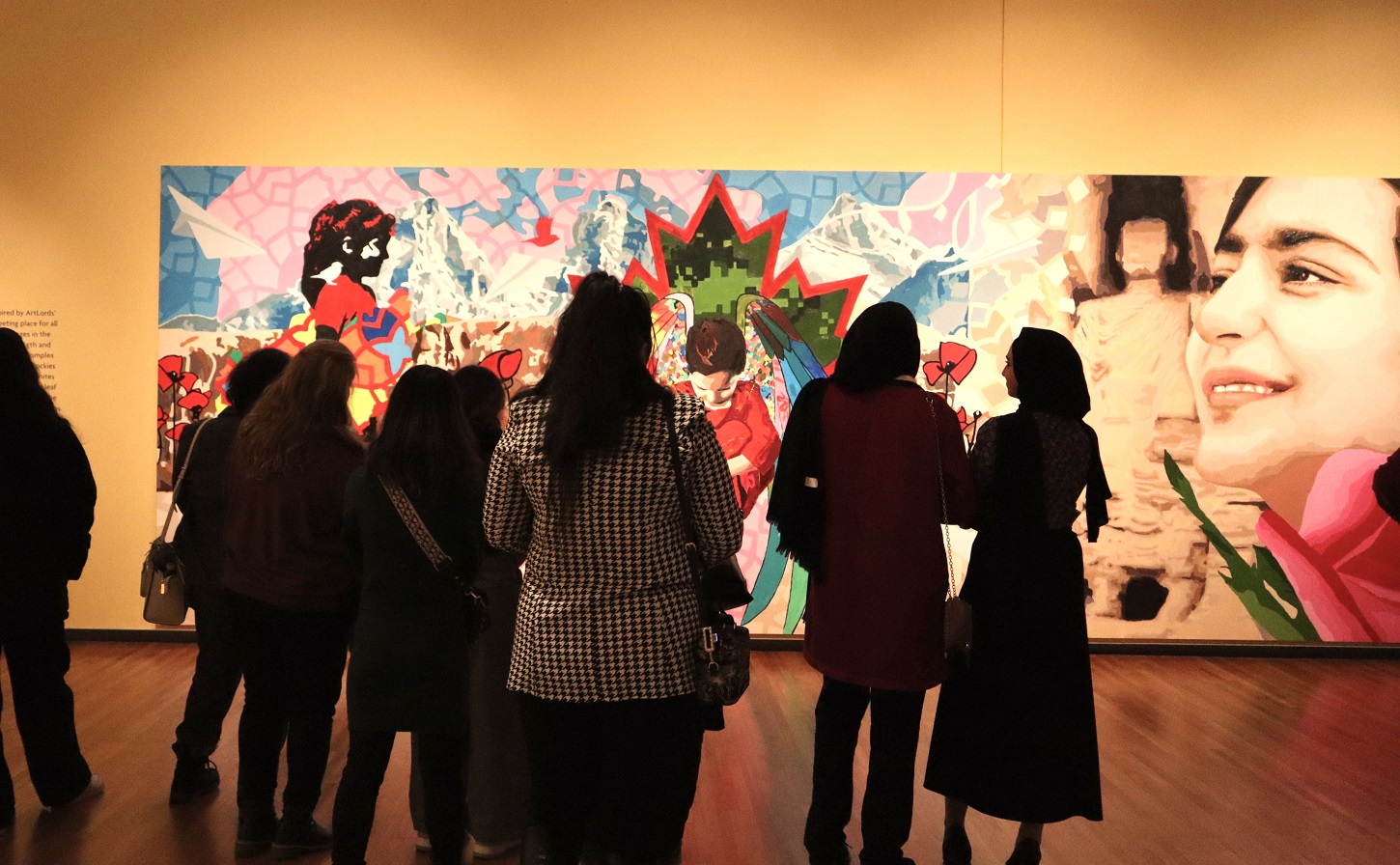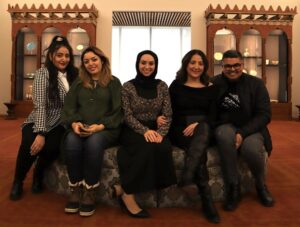Getting to the Heart of the Matter

Subscribe to Catalyst
Subscribe to get our magazine delivered right to your inbox
Related Articles
Subscribe to Catalyst
Subscribe to get our magazine delivered right to your inbox
Related Articles
Dil Ba Dil (heart to heart) is one of several support programs for newcomers. It is part of ABRAR Trauma and Mental Health’s approach to complex and culturally informed care.
“I want people to develop their own perspectives on healing,” says Abrar Mechmechia, while looking to the future of ABRAR Trauma and Mental Health Services. She is thinking about where her organization could be in five years and reflecting back on her lived experience while training as a counsellor in 2011 as the war broke out in Syria. For Mechmechia, healing can work in many ways in terms of shifting perspectives — it’s an ongoing complex process that is different for each person.
This no-one-size-fits-all approach to newcomer mental health has shaped the dozen or so programs ABRAR has offered since its affordable fee-for-service work began in 2020. Mechmechia, who is based in Hamilton, now applies her experiences to co-develop its trauma-informed programs, including Dil Ba Dil (translated from Afghan proverbs and poetry as heart to heart), which launched in the fall of 2022.
The pilot project uses an early intervention model to help Afghan women that are new to Canada heal and thrive in their chosen communities. The program includes art-based mental health supports, along with group gatherings that enable them to share experiences and shine as they integrate and adapt to unfamiliar circumstances.
As one participant describes it: “This program relieves a lot of stress and makes me happy to live in Canada. Our facilitator, she’s awesome! She speaks so well, that you start to feel that you are valuable. You know there is someone to help you. I can speak for myself and there is someone who will listen.”
Afghan mental health advocate Shabnam Mahboobi leads the Dil Ba Dil program, which is facilitated by qualifying psychotherapist Vida Ghodraty. Mechmechia hopes to expand the program to include children and other genders.

Some of the ABRAR Trauma and Mental Health team: Aleem Punja and Ramzia Ashrafi (with Future Ready Initiative), Abrar Mechmechia, Lia Khalili, RP (with Bright Start Bright Future Counselling Centre), and Shabnam Mahboobi.
“We want to create more spaces for newcomers to support their mental health,” she says. Currently, ABRAR offers counselling, family coaching, group support, and workshops in English, Arabic, Persian (Farsi), Dari, and Hindi through a team of 12 professionals that includes three master of social work students on placement. These services, which are provided in person in the Greater Toronto Area and virtually across Canada, offer support around self-care, coping, dealing with migration trauma, forming resilient relationships, managing anxiety, and regulating emotions. For example, Brave Space is a support group intervention module for Muslim women impacted by Islamophobic incidents. This year, ABRAR will deliver it in London, Hamilton, Mississauga, and Kitchener, through funding from Islamic Relief Canada. The Friends and Coffee program, piloted with the Syrian Canadian Foundation, also helps Arabic-speaking newcomer women build support networks along with their own mental well-being.
“We know that women are not noticed enough in our own communities,” Mechmechia says. “She runs the house, does the errands, raises the kids, but no one asks how she is doing as a newcomer to Canada, in learning the language, preparing the kids for the future, and all the other daily responsibilities. These women need that space.”
ABRAR also offers training to other organizations on newcomer mental health care and trauma-informed approaches, and they are developing outreach initiatives to those recently arrived from Ukraine.
Trauma after trauma
Topics addressed in past sessions include goal setting, racism and mental health, parenting challenges, and the intersection of migration trauma and the pandemic. As Mechmechia points out, the latter topic is particularly complex.
“It has been hard for many to navigate through the pandemic. You are stuck at home with your own thoughts, trauma, and memories. People are losing jobs and the people they love. It can be a lot to deal with. I personally felt the same. And much of it is out of people’s control.”
This layering of trauma over trauma can be continuous and complex. “Lots of people are in a place where they have many big incidents come together in their life,” she adds. “People have not healed and are dealing with these complex traumas. They feel the stress in their bodies — sometimes more than they acknowledge.”
Among the many ways this can manifest is in sleeping problems.
“Back home in Syria, I would see children who were dealing with nightmares. They really live with the symptoms. In the past, I worked with recent newcomers on their trauma. They came, they established themselves, and then, after five years it started showing. Kids that came to Canada from Iraq started showing issues 10 years later with more complex symptoms. I believe that the outcomes of the pandemic have not yet shown up.”
According to “Social Determinants of the Mental Health of Young Migrants” — a recent European Journal of Health Psychology study of more than 2,000 adolescents — newcomers suffer more from post-traumatic stress disorder and peer problems, while non-newcomers and non-migrants experience more hyperactivity. Across these groups, discrimination adversely affects all aspects of mental health. Although family support serves as a protective factor, the research points to the need for a tailored and diversified approach to mental health care for newcomers, non-newcomer migrants, and non-migrants, with interventions that foster social support from friends being particularly beneficial.
ABRAR’s own research, which supports this finding, has led them to partner with dozens of organizations across the country on developing programs for people from 2SLGBTQ+ and BIPOC communities, newcomers, and youth with disabilities, in and from care, or who self-identify as marginalized.
In turn, their work with individuals and groups informs the research they produce. For example, with In This Together, a report based on work with 20 youth advocates across the country during the first year of the pandemic, the ABRAR team found that financial barriers, ineffective treatment, stigma, a lack of cultural sensitivity, and challenges with academic support affected the mental health of marginalized youth. The organization hopes to ask policy makers for more investments in early intervention programs and to continue to develop culturally diverse services and providers. ABRAR’s ideal approach would link governments, ministries, and program sectors to put greater priority on funding community-based services.
Through this work, Mechmechia wants to build a bridge between youth and decision makers. “We want youth to know they are not alone,” she says. In addition, ABRAR has signed on to the Act for Mental Health campaign (led by the Canadian Mental Health Association), which is advocating for universal publicly funded mental health care to improve affordability and access.
As we return to our conversation about the future of her organization, Mechmechia emphasizes the importance of that process. “Vision motivates people to move forward,” she says. “Humans need a goal, and for us, I think in five years we would like to be everywhere in Canada to support newcomers and refugees dealing with trauma on the ground.
“The world is complicated — some people get to live peacefully and calmly. When they don’t get to do that, they don’t see an end. Much like the pandemic, people don’t know when they will be done with the trauma. We want to help people see the ways their experiences can shift their perspective.”




